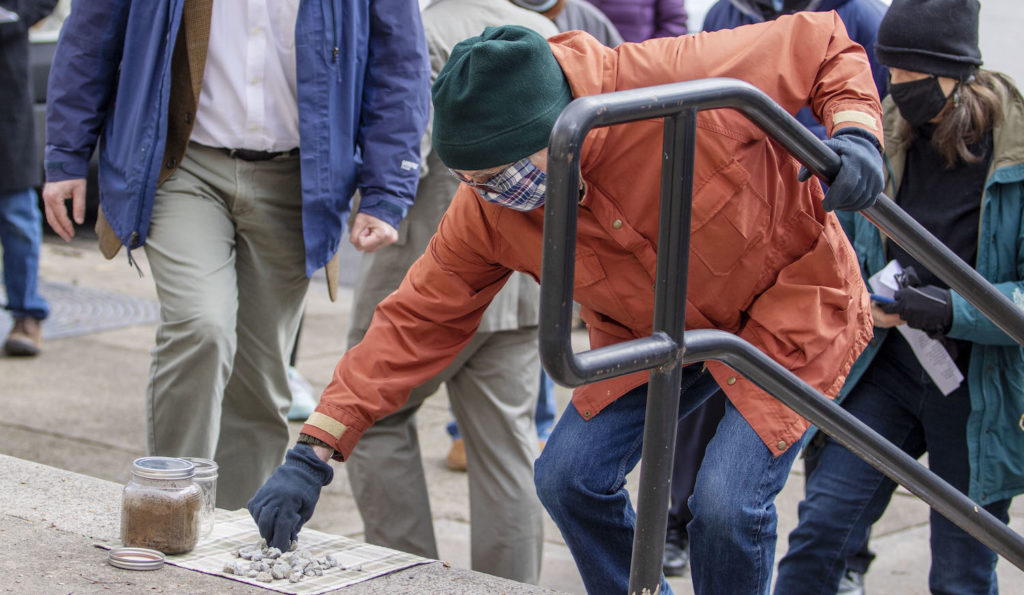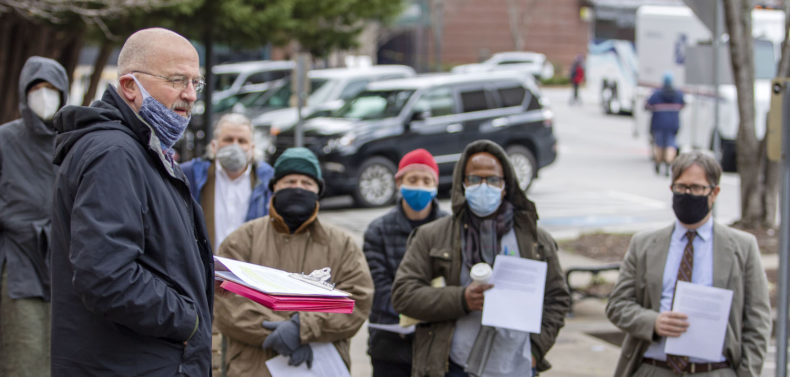One hundred years ago today, John Lee Eberhart was being held in a jail cell on the top floor of the Clarke County Courthouse on charges of killing the wife of a prominent Oconee County farmer.
That evening, an estimated crowd of 3,000 people had gathered outside the courthouse. Members of the white mob broke into the courthouse, then the jail, and dragged out Eberhart, a 25-year-old Black man. A caravan of cars took him to the site of the murder off what’s now Highway 441.
There, Eberhart was chained to a tree while the mob conducted a mock trial, throughout which he proclaimed his innocence. Then they set him on fire.
A coroner’s inquest concluded that Eberhart died “at the hands of unknown citizens.” No one was ever prosecuted for the lynching.
A group of about 50 people gathered at the courthouse today to remember Eberhart’s death. The vigil was organized by John Cole Vodicka and Steve Williams, volunteer court observers with Oconee Street United Methodist Church’s Courtwatch program.

Vodicka held a similar ceremony in June commemorating the 115th anniversary of a 1905 mass lynching in Watkinsville in which a mob shot to death eight people seized from the local jail.
He also dedicated today’s event to Ahmaud Arbery, an unarmed Black man shot and killed on Feb. 23, 2020 in Glynn County. The white men prosecutors say were responsible—father and son Gregory and Travis McMichael and William “Roddie” Bryan—were not charged for over two months, until the Arbery family’s lawyer released video of the shooting.
Ash Wednesday on Feb. 17 is the start of Lent, and Oconee Street UMC pastor Laura Patterson said it is a time of repentance when Christians confess, ask for forgiveness and take action to make amends. She called on local elected officials to address “historic sins in our community.”
Earlier this month, Mayor Kelly Girtz issued a statement apologizing for urban renewal programs that displaced hundreds of Black residents in the 1960s. Tonight, the Athens-Clarke County Commission is scheduled to vote on a proclamation related to Linnentown, a neighborhood off Baxter Street that was leveled to make way for UGA dorms.
The resolution states that “… the City of Athens and the University System of Georgia perpetrated an act of institutionalized white racism and terrorism resulting in intergenerational Black poverty, dissolution of family units, and trauma through the forcible removal and displacement of Black families, and the accumulation of the majority of their wealth and political power within the City of Athens and the University of Georgia.”
It calls for historical markers to recognize Linnentown, as well as investment in other underserved communities.
Like what you just read? Support Flagpole by making a donation today. Every dollar you give helps fund our ongoing mission to provide Athens with quality, independent journalism.










